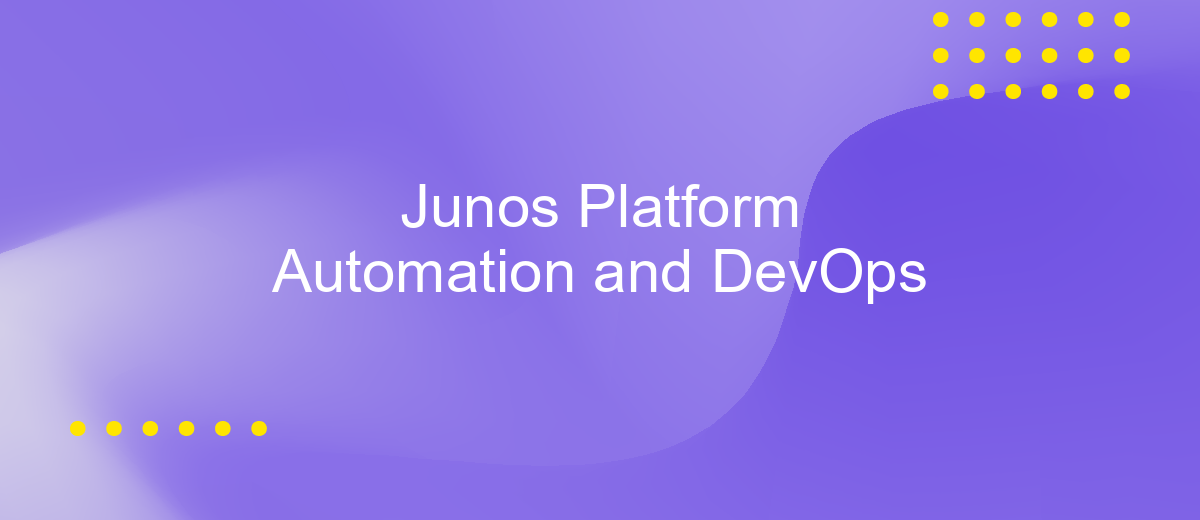Junos Platform Automation and DevOps
The Junos Platform is at the forefront of network automation and DevOps, offering robust tools and features that streamline operations and enhance efficiency. By leveraging automation, Junos simplifies complex network tasks, reduces human error, and accelerates deployment processes. This article explores how integrating DevOps principles with the Junos Platform can transform network management, enabling teams to deliver faster, more reliable services in today's dynamic IT environments.
Junos Platform Automation Overview
The Junos Platform offers a robust suite of automation tools designed to streamline network operations and enhance efficiency. By leveraging automation, network administrators can reduce manual tasks, minimize errors, and focus on strategic initiatives. Junos automation is built on open standards, enabling seamless integration with various systems and tools. This flexibility empowers organizations to customize their automation strategies to meet specific operational needs, paving the way for more agile and responsive network environments.
- Scripted automation using Junos Automation Scripting Environment.
- Integration with DevOps tools like Ansible, Puppet, and Chef.
- Support for RESTful APIs to facilitate programmatic control.
- Event-driven automation with Junos Telemetry Interface.
- Enhanced security through automated compliance checks.
Adopting automation within the Junos Platform not only improves operational efficiency but also enhances network reliability and security. By automating routine tasks, organizations can significantly reduce the risk of human error and ensure consistent configurations across devices. As networks continue to grow in complexity, Junos automation provides the necessary tools to manage these challenges effectively, ensuring that businesses can keep pace with technological advancements and evolving demands.
Benefits of Junos Platform Automation

Junos Platform Automation brings numerous advantages to network management, significantly enhancing efficiency and reducing operational costs. By automating repetitive tasks, network administrators can focus on strategic initiatives rather than mundane operations. This not only accelerates time-to-market for new services but also minimizes human errors, ensuring more reliable network performance. Moreover, automation facilitates rapid scaling of network resources, accommodating growing demands without the need for proportional increases in manpower.
Another significant benefit of Junos Platform Automation is its seamless integration capabilities with various services, such as ApiX-Drive. This integration enables streamlined workflows and enhanced data synchronization across platforms, further optimizing network operations. By utilizing such services, organizations can easily connect different applications and automate complex processes, leading to improved operational agility. As a result, businesses can respond faster to market changes, ensuring they remain competitive in a rapidly evolving digital landscape. Overall, Junos Platform Automation not only enhances operational efficiency but also empowers businesses to innovate and adapt with greater ease.
DevOps and Junos Platform Automation

Junos Platform Automation is revolutionizing network management by integrating DevOps principles, which emphasize collaboration, continuous integration, and delivery. This synergy enhances operational efficiency and reduces the time to deploy network services. By automating routine tasks, Junos allows network engineers to focus on innovation and strategic projects, ensuring robust network performance and reliability.
- Streamline configuration management through automated scripts and tools.
- Implement continuous monitoring and alerting for proactive issue resolution.
- Facilitate seamless software updates and patches without downtime.
- Enhance collaboration between development and operations teams.
- Leverage APIs for custom automation solutions tailored to specific needs.
By embracing DevOps methodologies, Junos Platform Automation not only accelerates the deployment of network changes but also ensures a high level of consistency and accuracy. This approach minimizes human error and enhances security, as automated systems can quickly adapt to new threats and vulnerabilities. Ultimately, the integration of DevOps with Junos Automation empowers organizations to achieve greater agility and scalability in their network operations.
Use Cases for Junos Platform Automation

Junos Platform Automation offers a robust framework for enhancing network operations, providing significant advantages in efficiency and reliability. By automating routine tasks, organizations can reduce human error and free up valuable resources for more strategic initiatives. This automation is crucial in today’s fast-paced networking environment, where rapid deployment and maintenance are required to stay competitive.
One of the most compelling use cases for Junos Platform Automation is in network configuration management. Automating configuration tasks ensures consistency across devices and reduces the time needed for deployment. Furthermore, Junos automation tools can be leveraged for real-time monitoring and troubleshooting, allowing for quicker response times to network issues.
- Automated configuration management for consistent device settings.
- Real-time monitoring and alerting for proactive network maintenance.
- Efficient troubleshooting with automated diagnostics and remediation.
- Scalable deployment processes for new network devices and services.
By implementing Junos Platform Automation, organizations can significantly enhance their network operations, ensuring a more reliable and agile infrastructure. This leads to improved service delivery and customer satisfaction, as networks become more resilient and adaptable to changing demands.
- Automate the work of an online store or landing
- Empower through integration
- Don't spend money on programmers and integrators
- Save time by automating routine tasks
Best Practices for Junos Platform Automation
To effectively implement automation on the Junos platform, it's crucial to start with a clear understanding of your network's requirements and objectives. Begin by defining specific goals for automation, such as reducing manual configuration errors, improving operational efficiency, or enhancing network performance. Utilize Junos automation tools like PyEZ, Ansible, or NETCONF to streamline processes and ensure consistency across the network. Regularly update and maintain your automation scripts to adapt to evolving network demands and software updates.
Integration plays a pivotal role in successful automation. Tools like ApiX-Drive can facilitate seamless integration between various applications and services, allowing for more efficient data flow and process automation. Ensure that your network automation strategy includes robust testing and validation phases to avoid disruptions. Implement version control for your scripts and configurations to track changes and facilitate rollbacks if necessary. Finally, foster a culture of continuous learning and adaptation within your team to keep up with the latest advancements in network automation technologies and practices.
FAQ
What is Junos Platform Automation and how does it benefit network management?
How can I get started with automating tasks on Junos devices?
What role does DevOps play in Junos Platform Automation?
How can I integrate third-party applications with Junos for enhanced automation?
What are some common use cases for automation in Junos networks?
Time is the most valuable resource for business today. Almost half of it is wasted on routine tasks. Your employees are constantly forced to perform monotonous tasks that are difficult to classify as important and specialized. You can leave everything as it is by hiring additional employees, or you can automate most of the business processes using the ApiX-Drive online connector to get rid of unnecessary time and money expenses once and for all. The choice is yours!


